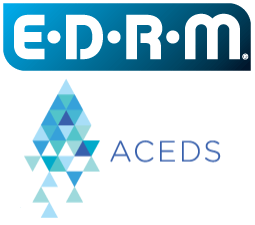Today is the start of LegalTech® New York 2015 (LTNY) and, for the fifth year in a row, eDiscoveryDaily is here to report about the latest eDiscovery trends being discussed at the show. Over the next three days, we will provide a description each day of some of the sessions related to eDiscovery to give you a sense of the topics being covered. If you’re in the New York area, I encourage you to check out the show – there are a number of sessions (both paid and free) available and over 199 exhibitors providing information on their products and services.
While at the show, we will (also for the fifth year in a row!) be interviewing several industry thought leaders to see what they think are the significant trends for 2015 and, which of those are evident at LTNY. After the show, we will announce the series of thought leader interviews and identify when each will be published. Mark your calendars!
Perform a “find” on today’s LTNY conference schedule for “discovery” or “information governance” and you’ll get 84 hits. So, there is plenty to talk about! Sessions in the main conference tracks include:
10:30 – 11:45 AM:
Information Management in the Age of the New Attorney
Some of the biggest changes currently in the legal IT environment are coming from the changing expectations and methods by which today’s attorneys want to work. As a new generation of attorneys rises to firm management, how does traditional information management need to change to accommodate the always-on, mobile, social, attorney? How can firms take advantage of new approaches to gain greater agility and better meet attorney – and client – demands for access to key information?
In this panel discussion, we will explore these topics with a panel of CIOs and IT Directors, and review what their organizations are doing to meet attorney and client expectations today as well as plans and ideas for the (near) future.
Speakers to include: Dan Carmel (Discussion Leader), Head of ECM Strategy and Solutions, HP Big Data; Marat Borodovskiy, IS Director, Prudential; Bill Koch, Director of Technology Services, Womble Carlyle Sandridge & Rice, LLP; Glenn O’Brien, Director, Electronic Discovery, Liberty Mutual Insurance; Usman Nayyar, Director of Applications and Technology Solutions, Proskauer.
Information Governance and E-Discovery – Working Across Disciplines to Improve Outcomes and Add Value
In conversations among thought-leading legal professionals and technologists, the subject of “information governance” features prominently. But how do these leaders define information governance, and why has the topic become so important? And what is the relationship to e-discovery?
In this program, panelists at the forefront of information governance will discuss the various ways in which their discipline relates to e-discovery. They will explain how a sound information governance initiative can help make e-discovery more efficient and effective, and less expensive. And they will help us understand how, in turn, a thoughtful and strategic e-discovery program can contribute back to the organization’s information governance. The panel will offer practical advice on breaking down silos and working across disciplines to create and enhance that information value loop.
Speakers to include: Maureen O’Neill (Discussion Leader), Senior Vice President, Discovery Strategy, DiscoverReady; Lauren Barnes, VP Records and Information Management, Credit Suisse; Juliet M. Hanna, Associate General Counsel, Fannie Mae; Julie Heller, VP & Global Head of eDiscovery Programs, Legal Operations Center, AIG.
Advice from Counsel: Case Studies of What’s Working in E-Discovery Today
Forget the theoretical. This is pure brass tacks. E-discovery practitioners are streamlining their processes, using advanced technology, and dramatically reducing the cost of e-discovery. In-house counsel, litigation support, outside counsel and service providers are all playing a part in transforming chaotic e-discovery procedures into a regular business process. This case study session will showcase what’s working today for corporations and law firms handling e-discovery matters large and small. Results from the 6th annual Advice from Counsel study on in-house e-discovery trends will supplement the case study discussions.
Speakers to include: Sophie Ross (Discussion Leader), Senior Managing Director, FTI Technology; Shari Aberle, Partner, Dorsey; Ari Kaplan, Principal, Ari Kaplan Advisors; Nicole Schaefer, Litigation Support Director, Janney Montgomery Scott.
Data Analytics for eDiscovery and Investigations – A Practical Approach
Data analytics on structured information (Oracle/SQL databases, mainframe data, etc.) is a specialized discipline that can help companies address issues related to litigation and sophisticated fraud and white collar crime. Forensic data analytics professionals must understand issues particular to the review of data contained in a structured format (i.e., enterprise financial systems and operational data stores). As with traditional computer forensic analysis on unstructured data, successful structured data eDiscovery is comprised of key work steps including identification, preservation, collection, processing, hosting, review, and production of structured data. This discussion will provide an overview and practical approach detailing the processes related to the analysis of structured data for eDiscovery and investigations.
Speakers to include: Tom Keegan (Discussion Leader), Principal Forensic Advisory Services, KPMG LLP; Elizabeth Asali, Litigation Counsel, GlaxoSmithKline; Jeffrey Greene, Shareholder, Greenberg Traurig; Wendy Predescu, Principal, KPMG LLP.
12:30 – 1:30 PM:
Taking TAR to the Next Level: Recent Research and the Promise of Continuous Active Learning — OPEN TO ALL
Three years ago, panelists Judge Andrew J. Peck and Maura R. Grossman introduced Technology-Assisted Review (TAR) to a standing-room-only crowd at LegalTech 2012. Since then, TAR—with its promise of substantial reduction in review costs—has entered the mainstream of high-volume discovery, both in the U.S. and around the world.
In 2015, the grand challenge is to make TAR even more accessible and more effective while addressing the real-world limitations of first-generation TAR products. Our panel will talk about the latest research on TAR protocols, focusing on newer methods like Continuous Active Learning, which have been shown to identify relevant documents more quickly, and to further reduce review costs. Discussion topics include:
- How does Continuous Active Learning work, and how does it differ from earlier TAR protocols?
- Which kinds of seed are most effective in TAR training, random or judgmental and why?
- Are subject-matter experts required for TAR training, or can review teams do the job just as well?
- How will the courts evaluate TAR and Continuous Active Learning? What kind of evidence is required to move best practices forward?
- What kinds of savings can you expect from Continuous Active Learning versus other protocols? Should different protocols be used for different types of cases?
Join us for an informative hour focusing on the future of TAR for 2015 and beyond. Learn about the first peer-reviewed study comparing TAR protocols and how its findings may be applied in judicial and corporate settings. Pick up your free guide to Continuous Active Learning so you can learn more about this powerful new option for TAR review.
Speakers to include: John Tredennick (Discussion Leader), CEO and Founder, Catalyst Repository Systems, Inc.; Gordon V. Cormack, Professor, David R. Cheriton School of Computer Science, University of Waterloo; Maura R. Grossman, Of Counsel, Wachtell, Lipton, Rosen & Katz; Susan Nielsen Hammond, Records, eDiscovery & Forensics Counsel, Regions Financial Corporation; Honorable Andrew J. Peck, Magistrate Judge, United States District Court for the Southern District of New York.
2:00 – 3:15 PM:
Counsel’s Secret Weapon in the Information Wars: Governance Strategies and Tactics
Organizations face increasing pressure when responding to litigation, investigations, and regulatory compliance demands. Factors adding to this pressure are shortened time frames, increasingly disparate information, and tight budgets. It is essential to proactively prepare for these challenges with an information governance strategy that ensures your data can be accessed, analyzed, and understood quickly and cost effectively.
In this session, learn how to evaluate technology solutions, best practices for deploying these solutions in conjunction with IG policies, and how you can gain strategic insight from your data.
Speakers to include: Matt Levy (Discussion Leader), eDiscovery Subject Matter Expert, HP; Jason R. Baron, Of Counsel, Drinker Biddle & Reath LLP; Gareth Evans, Partner, Gibson, Dunn & Crutcher LLP; Marty Provin, Executive VP, Jordan Lawrence; Jason Van Volkenburgh, Associate General Counsel, Hunter Douglas.
E-Discovery Insourcing vs Outsourcing
This session will focus on the key issues attorneys, paralegals and litigation support staff should consider when deciding whether to insource or outsource e-discovery. While they may seem elementary, time, cost and complexity continue to be some of the greatest challenges e-discovery practitioners face today. Join us as our panel discusses some of the key elements to consider when deciding on an e-discovery solution.
Speakers to include: Edward Sohn (Discussion Leader), Global Director, Legal Managed Services, Thomson Reuters; Anthony J. Diana, Partner, Reed Smith; Glen McFarlane, Managing Director, JPMorgan Chase; Karin Scholz Jenson, Partner and National Co-Leader, E-Discovery Advocacy and Management Team, BakerHostetler.
The Predictive Coding Soundtrack: Rewind, Play, Fast-Forward
Over the last several years, predictive coding dominated conversations among e-discovery practitioners. But as we move into 2015, it seems the hype about predictive coding – and the too-good-to-be-true marketing promises – have quieted down. So what are we talking about now? What are organizations actually doing today with predictive coding? And how have these conversations about predictive coding impacted other aspects of e-discovery?
This program will take a look back at the promises made about predictive coding as these powerful tools came to the e-discovery market. And then our panel of experts – including corporate practitioners who actively use predictive coding – will discuss how the tools are being deployed today. They will explain what they have learned about the most effective ways to “train” predictive coding software; how to combine predictive coding with keyword terms and other methods of narrowing and searching data sets; the importance of statistical testing and validation in e-discovery generally; and developing a strategy for involving the other side (or not) in an e-discovery process. Finally, the panel will take a look towards the future, and explore how they expect to use predictive coding and other analytics tools going forward.
Speakers to include: Amy Hinzmann (Discussion Leader), Senior Vice President, Managed Review, DiscoverReady; Marla Bergman, Vice President, Associate General Counsel, Goldman Sachs; Elizabeth A. Jaworski, Director, Legal Operations, Motorola a Lenovo Company; Daniel S. Pariser, Partner, Arnold & Porter.
3:45 – 5:00 PM:
How to Take Advantage of the Cloud for eDiscovery
Today’s eDiscovery professionals must be able to quickly respond to requests and investigations, while reducing costs at the same time. But technology can be the stumbling block that prevents many from achieving these goals—especially when legal teams spend more time and money managing hardware and software than they spend on their litigation process. Fortunately, cloud environments offer a more secure and cost-effective way.
Join this panel session to learn how emerging cloud-based, self-service deployments can empower legal professionals to focus on managing the eDiscovery process while allowing the experts to manage the technology operations and security.
Speakers to include: Eric Crespolini (Discussion Leader), eDiscovery Subject Matter Expert, HP; Johnny Lee, MD, Forensic, Investigations & Dispute Services, Grant Thornton LLP; Robert Levy, Counsel, Civil Justice Reform and Law Technology, Exxon Mobil Corporation; Alan M. Winchester, Partner, Harris Beach PLLC.
E-Discovery Challenges in Government Investigations and Regulatory Matters
When dealing with the government in an investigation or regulatory matter, organizations face unique challenges around e-discovery. The lack of e-discovery expertise among many government legal professionals, and the lack of technical support and resources available to them, can make it difficult for companies to work with the government in connection with discovery requests. Other issues that compound this difficulty include:
- The “cooperative” posture often associated with governmental investigations;
- the increased transparency requested by the government;
- the broad breadth and compressed timelines associated with many government requests; and
- the government’s increasing tendency to request the use of specific discovery protocols, including technology assisted review.
In this program, the panelists will explore how organizations can overcome these challenges and more effectively handle discovery in government matters. They will discuss how to identify the scope of the government’s request and work to appropriately tailor a discovery solution that is reasonable, cost efficient, and defensive – and if necessary, educate the agency about e-discovery along the way. The program will also explain the obligations to preserve information relevant to a government matter, and the ramifications – including criminal liability – for spoliation of evidence. Finally, the panelists will discuss the role of predictive coding and other advanced analytics in government discovery.
Speakers to include: Matt Miller (Discussion Leader), Senior Vice President, Discovery Strategy; DiscoverReady, Josh Durham, Partner, Poyner Spruill LLP; Jill Griset, Partner, McGuire Woods; Allan Hsu, Director, Fannie Mae; Jerami D. Kemnitz, Senior Discovery Counsel – Global Head of eDiscovery, Wells Fargo; Michelle Spak, Associate General Counsel, Duke Energy Corporation.
Killing Two Birds With One Stone: Optimizing Information Governance for Easier E-Discovery
From protecting sensitive customer data from cyber threats, to complying with data privacy laws, corporate information governance projects are quickly becoming “must do” projects. How can legal teams leverage these information governance projects for their own e-discovery needs? What are some of the practical steps corporations can take to produce measurable benefits from information governance? How do these information governance projects impact the role of outside counsel?
Attend this session to hear corporate practitioners discuss best practices for implementing practical information governance programs and their impact on e-discovery.
Speakers to include: Jake Frazier (Discussion Leader), Senior Managing Director, FTI Technology; Michael Lisi, Director of Litigation Support, Fidelity Investments; Rachel Rubenson, Vice President-Global eDiscovery Counsel, Barclays; Joseph Steffan, Chief Privacy Compliance Officer, Morgan Stanley.
Achieving Global Consistency Across your eDiscovery Processes
As multi-national companies continue to manage a portfolio of litigation and investigations, it has become a priority for organizations to achieve global consistency in their eDiscovery processes. Key elements in putting in place a global approach to eDiscovery include defensible processes, predictable outcomes, reduced cost and gain in efficiencies.
This presentation will detail how to achieve global consistency and ideas on areas of focus including use of discovery playbooks, standard operating procedures, checklists, using a consistent technology workflow, and the role of outside service providers.
Speakers to include: Lucie Miller (Discussion Leader), Director, KPMG LLP; Denise Backhouse, Shareholder, Littler Mendelson; Kelly Clay, Senior Counsel and Director of Information Management, GlaxoSmithKline; Michelle Mattei, Associate Director, Healthcare Compliance, Medivation, Inc.; Jeff Sharer, Partner, Sidley Austin LLP.
In addition to these, there are other eDiscovery-related sessions today. For a complete description for all sessions today, click here.
eDiscoveryDaily will also be “tweeting” periodically throughout LTNY, so feel free to check out our updates at twitter.com/Cloud9Discovery.
So, what do you think? Are you planning to attend LTNY this year? Please share any comments you might have or if you’d like to know more about a particular topic.
Disclaimer: The views represented herein are exclusively the views of the author, and do not necessarily represent the views held by CloudNine. eDiscoveryDaily is made available by CloudNine solely for educational purposes to provide general information about general eDiscovery principles and not to provide specific legal advice applicable to any particular circumstance. eDiscoveryDaily should not be used as a substitute for competent legal advice from a lawyer you have retained and who has agreed to represent you.







